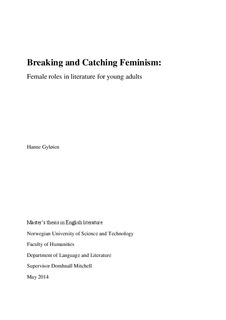Breaking and catching feminism: female roles in literature for young adults
Master thesis
Permanent lenke
http://hdl.handle.net/11250/299362Utgivelsesdato
2014Metadata
Vis full innførselSamlinger
Sammendrag
In this thesis, I investigate female roles in literature for young adults, taking a comparative approach to a number of the most popular and bestselling works in recent times, The Twilight Series (2005-2008) by Stephenie Meyer and The Hunger Games (2008-2010) by Suzanne Collins. The thesis will open with a brief historical overview of the history of feminism followed by a descriptive summary of the origins and developments of children’s literature/ young adult literature in the United States. Here I want to look at what models of behavior were established in selected magazines, journals and books addressed to young women – such as Godey’s Lady’s Book from the 1840s, which avoided overtly political issues but did cover social affairs that were of interest and relevance to young middle-class women of European descent. What kinds of articles were included here, and which messages were sent to women? My research suggests that morality, tradition, the centrality of family, decorum in dress and manners, and Christian morality, are paramount. Conduct manuals, attempting to educate its audience on social norms, will also be looked at. Before focusing my attention on the Twilight-series and The Hunger Games trilogy I look at how certain feminine ideals are brought up to date and reflected in twentieth century literature addressed to young women such as Daddy Long Legs (1912) by Jean Webster and the Nancy Drew-series (published from 1930).
